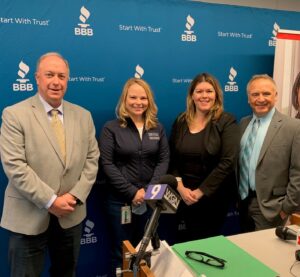
CHICAGO – During the holidays, individuals falsely claiming to work for utilities have historically tried to take advantage of people’s busy, end-of-year schedules to scam families and businesses out of money and personal information.
To increase awareness of scams and scam attempts, the Better Business Bureau, along with representatives from ComEd, Nicor Gas, North Shore Gas and Peoples Gas, joined forces today to provide tips to help Chicago-area customers identify scams this holiday season.
Steve Bernas, president and CEO of The Better Business Bureau of Chicago and Northern Illinois states, “The number of reported scams generally rises with the holidays. Nationally, there has been an uptick in people claiming to be utility company workers over the past several years. In fact, they are scam artists who pose as utility workers and who usually target customers through door-to-door visits and phone calls.”
Polly Eldringhoff, vice president, North Shore Gas and Peoples Gass says, “The safety of our customers is a top priority in everything we do. That includes helping protect our customers from scammers who may be after people’s personal data and hard-earned money. Raising awareness and educating consumers about the issue is critical to preventing problems.”
In recent years, scammers have gotten deceptively creative with increased calls, texts, emails and in-person tactics, contacting electric and gas customers asking for immediate payment to avoid service disconnection.
In a door-to-door scam, someone impersonating a utility worker will visit customers’ homes looking to get money and personal or account information. In some cases, the scammer will try to lure the customer out of their home so that another scammer can enter and steal their belongings.
While types of phone scams vary, they usually feature individuals posing as utility employees stating that a customer’s billing cycle has changed and payment is needed immediately, or that the customer’s account is past due and immediate payment is required to avoid disconnection of service.
According to the Federal Trade Commission, consumers nationwide reported losing more than $3.3 billion to fraud in 2020 – up significantly from $1.8 billion from 2019. Nearly $1.2 billion of losses reported last year were due to imposter scams.
Additional utility representatives weighed in:
- Nichole Owens, vice president of customer channels, ComEd: “With scammers increasing their activity ahead of the holidays, ComEd is committed to helping customers identify potential schemes so they don’t unwittingly send their money and personal information to fraudsters. We’re pleased to join the Better Business Bureau and other local utilities to share tips and advice that can help customers spot these scams and avoid falling victim to them.”
- Pat Whiteside, senior vice president of operations at Nicor Gas: “There are more resources and support available than ever before to help Nicor Gas customers. Together with the Better Business Bureau and local utilities, we are increasing our customers’ awareness, which is the best defense against dangerous scams and tactics.”
North Shore Gas, Peoples Gas, Nicor Gas and ComEd are among 150 U.S. and Canadian energy companies that recognize Nov. 14-20 as Utility Scam Awareness Week, a weeklong annual campaign created by Utilities United Against Scams to raise awareness and help educate customers on the tactics used by scammers.
The Illinois utilities also remind customers that representatives of their companies always carry proper identification and never use aggressive or intimidating tactics to pressure them into making a payment, nor will they ask for cash or a customer’s personal or financial information.
Don’t Get Scammed
Customers can avoid being scammed by taking a few precautions:
- Never provide Social Security, bank or personal information to anyone initiating contact with you claiming to be a utility representative.
- Always ask to see a company photo ID before allowing any utility worker into your home or business.
- When in doubt, check it out. Be skeptical of individuals wearing clothing with old or defaced company logos. If you have any doubts, ask to see a company photo ID.
- Never make payment for services to anyone coming to the door or to anyone calling to demand you to make a direct payment with a prepaid cash card, cryptocurrency or third-party banking app.
Utility customers who suspect or experience fraud should hang up, delete the email or shut the door; then immediately contact local authorities, followed by a call to the utility’s customer care center phone number listed on their billing statement.
